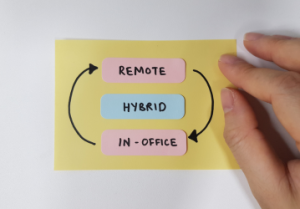Navigating the New Normal: Hybrid Working
 In the ever-evolving landscape of the professional world, the concept of hybrid and virtual work has become more than just a trend; it’s a fundamental shift in the way teams operate. Working in resilience and leadership, I find myself at the intersection of two critical components for success in this new era: resilience and virtual work.
In the ever-evolving landscape of the professional world, the concept of hybrid and virtual work has become more than just a trend; it’s a fundamental shift in the way teams operate. Working in resilience and leadership, I find myself at the intersection of two critical components for success in this new era: resilience and virtual work.
The Hybrid Challenge: Unveiling the Hurdles of a Virtual Landscape
While hybrid and virtual work offers unparalleled flexibility and access to a global talent pool, it also presents a unique set of challenges. From the blurred boundaries between work and personal life to the struggle with communication and collaboration, hybrid teams often find themselves facing hurdles that demand a special set of skills to overcome.
Isolation and Burnout
One of the most significant challenges is the sense of isolation that virtual workers can experience. The lack of face-to-face interaction may lead to feelings of loneliness and, in some cases, burnout as employees grapple with the constant demands of a digital environment. Those in the office speak when they are together and those working virtually slowly get left out fo the conversation more and more. It is never intentional and it happens over time. The virtual workers, feel even more isolated and left out.
Communication Breakdown
Effective communication becomes a delicate dance when conducted through screens and emails. Misinterpretations are more likely, and the absence of non-verbal cues can hinder the development of a shared understanding among team members. Active listening and making sure that everyone is on the same page is even more critical. Communication effort has to be much higher on the list of efforts when everyone is not sitting together. Also, think about the natural communication that happens when people sit together. Passing of information easily, through conversation. thing how someone who has just joined your team might feel. they do not know anyone and they do not have the casual conversation to find out stuff. How will you help them settle in?
Team Dynamics
Building and maintaining team dynamics in a virtual setting requires intentional effort. The spontaneous interactions that foster camaraderie in an office setting are often replaced by scheduled video calls, potentially impacting the sense of connection within the team. When we work virtually and hybrid, with people in different locations, it is even more essential to check in with each other and see how everyone is doing. Plan virtual coffee breaks to build relationships and trust to help aid communication.
Resilience as the Key to Remote Triumph
In navigating the myriad challenges inherent in virtual and hybrid work environments, resilience emerges as an indispensable key to triumph. Resilience, far from being merely an individual attribute, serves as a collective strength that organisations can actively cultivate. Delving deeper into the transformative role of resilience in the hybrid work experience reveals the following intricate elements:
Adaptability: Mastering Change Seamlessly
Resilience is synonymous with adaptability, enabling teams to effortlessly navigate the dynamic landscape of hybrid work. In this context, adaptability goes beyond a mere acknowledgement of change; it involves actively and skillfully adjusting to new challenges. Teams with a resilient mindset can swiftly pivot their strategies, workflows, and approaches in response to evolving circumstances, ensuring seamless transitions.
How to Foster Adaptability:
- Encourage a culture of continuous learning, where team members are empowered to acquire new skills and knowledge.
- Conduct regular training sessions focused on enhancing adaptive thinking and problem-solving skills.
- Facilitate open discussions about change, emphasizing the opportunities it presents rather than the disruptions it causes.
Emotional Intelligence: The Linchpin of Remote Collaboration
In the absence of traditional face-to-face interactions, emotional intelligence becomes paramount in maintaining healthy and effective virtual collaboration. Resilient individuals inherently possess high emotional intelligence, fostering an environment where positive and constructive communication thrives.
How to Enhance Emotional Intelligence:
- Implement training programs that focus on emotional awareness, empathy, and effective communication.
- Encourage regular check-ins to gauge the emotional well-being of team members.
- Provide resources and tools to help individuals manage stress, anxiety, and other emotional challenges.
Connection Amidst Distance: Fostering a Virtual Sense of Belonging
Resilience plays a pivotal role in bridging the physical gaps created by hybrid work. Leaders with resilience cultivate a sense of connection and belonging within the team, ensuring that every member feels supported and engaged, even in a virtual environment.
 How to Cultivate Connection Amidst Distance:
How to Cultivate Connection Amidst Distance:
- Organise virtual team-building activities and events to strengthen interpersonal bonds.
- Establish clear communication channels and protocols to facilitate easy and open interaction.
- Acknowledge and celebrate individual and team achievements to reinforce a sense of shared success.
In essence, resilience emerges not only as a concept but as a set of tangible skills and practices that, when intentionally developed, can propel hybrid teams towards unparalleled success. By fostering adaptability, enhancing emotional intelligence, and cultivating virtual connections, organisations can harness the true potential of resilience in the pursuit of triumph in the remote work landscape.
Maintaining Team Dynamics in a Virtual Setting: Tips for Success
- Regular Check-in: Schedule regular video calls for both work-related discussions and casual catch-ups. This helps recreate the informal interactions that contribute to a strong team bond.
- Define Clear Expectations: Communicate roles, responsibilities, and expectations within the team. This clarity eliminates misunderstandings and fosters a sense of purpose among remote team members.
- Encourage Open Communication: Create channels for open communication and feedback. Team members should feel comfortable expressing their thoughts and concerns, fostering a culture of transparency and trust.
- Celebrate Successes: Acknowledge and celebrate team achievements, no matter how small. Recognition boosts morale and reinforces a positive team culture.
The resilience and leadership required for success in hybrid working is so much more than just individual attributes. They are the foundation of a thriving team. By fostering resilience and implementing strategies to maintain team dynamics, organisations can navigate the challenges of hybrid work and emerge stronger in this new era of professional collaboration. As we continue to adapt to the ever-changing landscape, let resilience be the guiding force that propels remote teams toward success.



